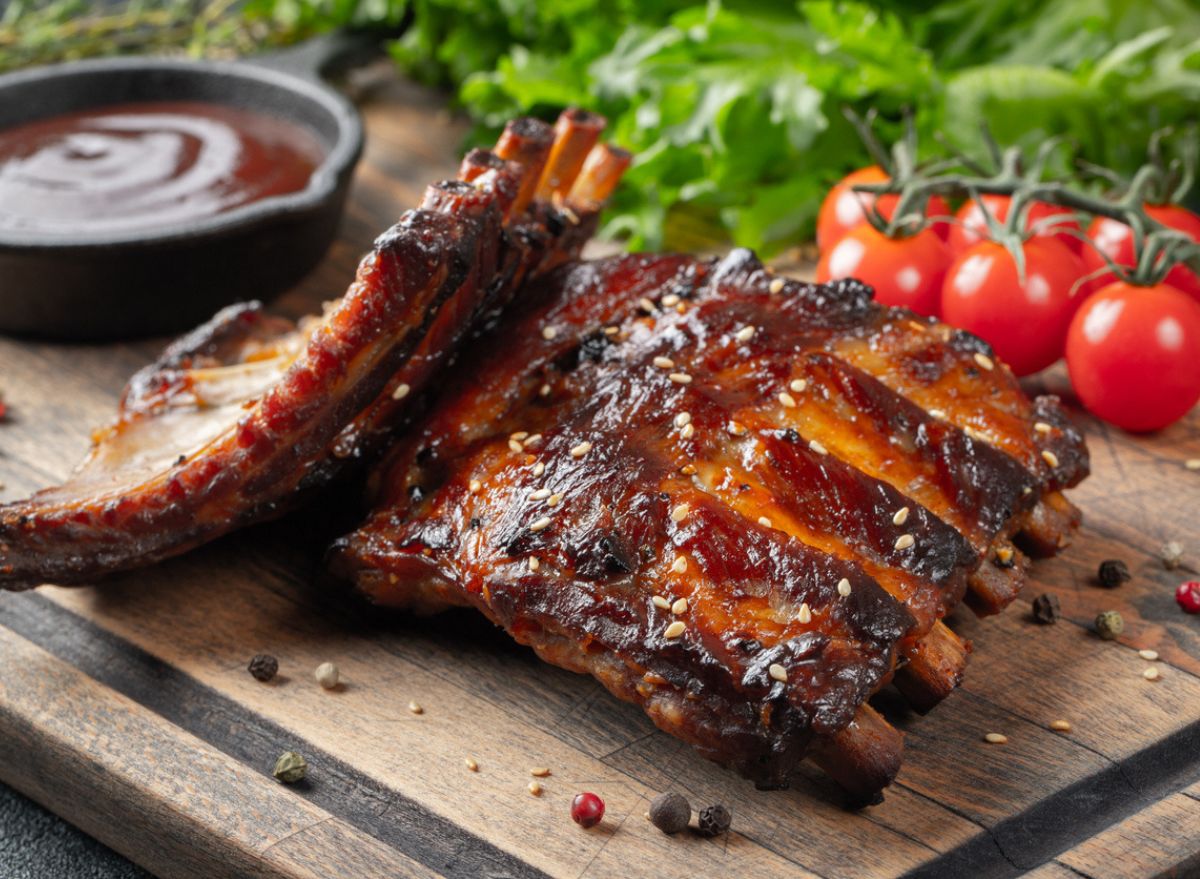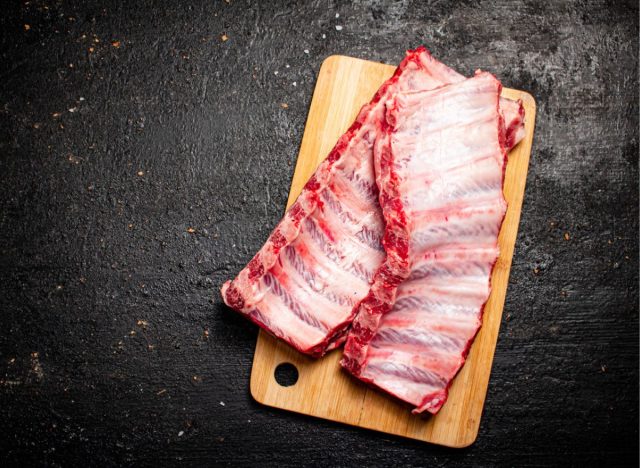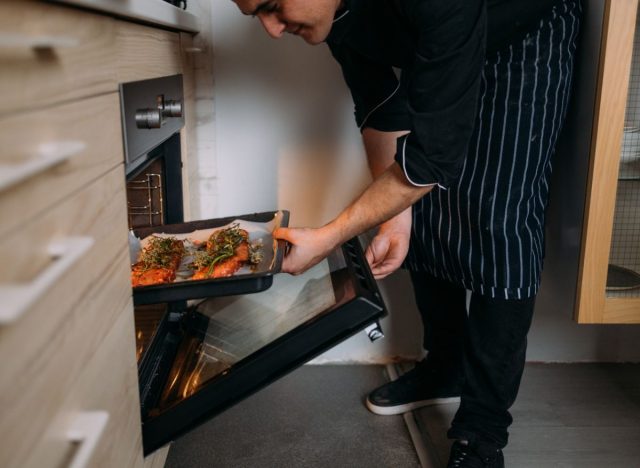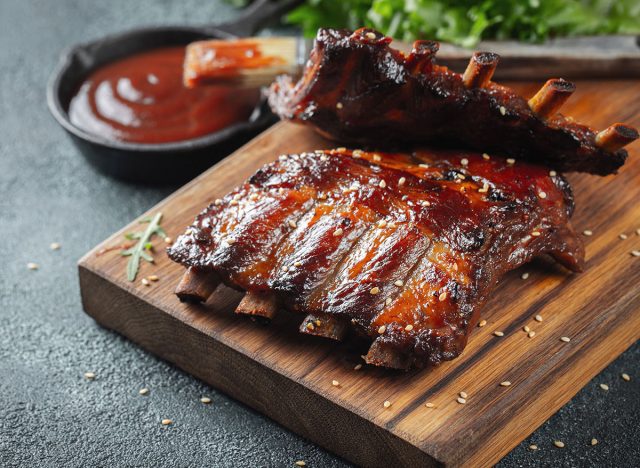The Absolute Best Way To Cook Ribs, According to Chefs

Ribs can be enjoyed all year round. They're great for a summer barbecue with friends, or a cozy family dinner to keep warm in the winter. They're an especially fun crowd-pleaser when it comes to big parties, too—which is why they're always a highly anticipated meat entree at many Super Bowl parties. If you're hosting or providing a dish for the upcoming Super Bowl face-off between the Kansas City Chiefs and the Philadelphia Eagles, cooking some ribs that fall right off the bone is guaranteed to instantly make you some new friends.
However, if you're not an experienced chef or are new to the world of cooking meat, cooking the best ribs can be a rather intimidating process. Whether you grill your ribs, slow-cook them, or bake them in the oven, it's all too easy to accidentally dry out a rack of ribs. And let's face it, there's nothing worse than a dry rack of ribs. To help you prep for any upcoming Super Bowl celebrations you may have on your calendar, we spoke with a handful of culinary experts to get their advice on how to cook the best ribs.
Remove the skin & trim excess fat

According to Deborah Rainford, Cordon Bleu-trained chef with a decade of cooking experience in Michelin-star kitchens, the first thing you'll want to do before cooking your ribs is something called "removing the membrane."
"The membrane on the back of the ribs—often called "silverskin"—can make them tough, so it's important to peel it off," says Rainford. "Use a sharp knife like a paring knife to loosen the membrane at one of the corners of the rack, then grip it with a paper towel and peel it off the back side of the ribs."
Once you've removed the silverskin, Rainford suggests then trimming the excess fat.
"Fat shrinks as it cooks, so you'll want to trim any excess fat off the ribs to reduce shrinkage of the ribs and improve flavor," she says.
Add flavor & tenderize the ribs
The next crucial step to cook the best ribs is to "add flavor and tenderize the meat with a mixture of vinegar, salt, sugar, and spices before cooking," explains the CEO of Fascinating Sky Catherine Snowden, who is also a professional chef that has worked in a variety of American, Italian, and French restaurants.
"The acid in the vinegar will help to break down the meat fibers, making it more tender," Snowden adds. "The salt and sugar help to balance the flavor and create a tasty crust when the ribs are cooked."
If you intend to add flavor by letting your ribs soak in a marinade, you're probably wondering how long is best to let your ribs soak these flavors up.
"Letting the ribs sit in it for a few hours or overnight," Rainford suggests. "It's best to use a Ziploc bag for the marinade, so that the air can be pushed out, and the marinade is then in contact with all of the meat."
Cook ribs at a low temperature

Arguably one of the most important steps when it comes to effectively cooking ribs to get the best results is to be sure that when cooking your meat, "low and slow" is always the way to go. In other words, for a more succulent and tender rack of ribs, it's best to keep the heat at a low temperature and let them cook slowly over a longer period of time.
"When cooking ribs, the perfect temperature is between 225°—250°," says Rainford. "This low and slow temperature allows the ribs to cook evenly and become tender without drying out or burning."
Snowden adds that the "low and slow" method "can be done in the oven, on a grill, or in a slow cooker."
If opting to grill your ribs, Rainford also claims that "you can keep the temperature consistent by adjusting the air vents on your grill, or adding [or] removing coals as needed."
Speaking of temperature, you can make your life a lot easier and have your ribs turn out a lot tastier if you also use a meat thermometer. "This is the best way to ensure that the internal temperature of the ribs has reached 145°–160° when you're done," says Rainford.
Baste your ribs as they cook
The process of basting meat involves taking a liquid and pouring it over the meat while it's cooking. This can be done to enhance the flavor of chicken, turkey, steak, and yes, you guessed it—ribs.
"Basting the ribs with a flavorful liquid during cooking helps to keep the meat moist and adds flavor," says Snowden. "You can use a mixture of BBQ sauce, apple juice, or other liquids, and brush it onto the ribs every 30 minutes or so during cooking. This will help to prevent the ribs from drying out and ensure that they are juicy and flavorful when finished."
"You can use a basting brush, silicone brush, or the traditional basting mop," Rainford advises with regard to selecting the best basting tool.
Let your ribs rest before serving

When your deliciously marinated, cooked, basted ribs are complete, the last step you'll need to take is simply letting them rest. But how longs should you let your ribs rest before serving, and is there a way to go about this step without your meat drying out?
"You'll want to let the ribs sit and rest for 20–30 minutes underneath a foil tent," says Rainford. "This allows the juices to redistribute through the ribs."
Letting your ribs rest prior to serving is perhaps the hardest step of the whole process, especially after following these other chef-approved tips for cooking the best ribs. Although you and your friends might be tempted to bite into your ribs immediately, be patient! Your effort will prove well worth the wait, as this resting period will lend itself to a more flavorful dish in the end.









